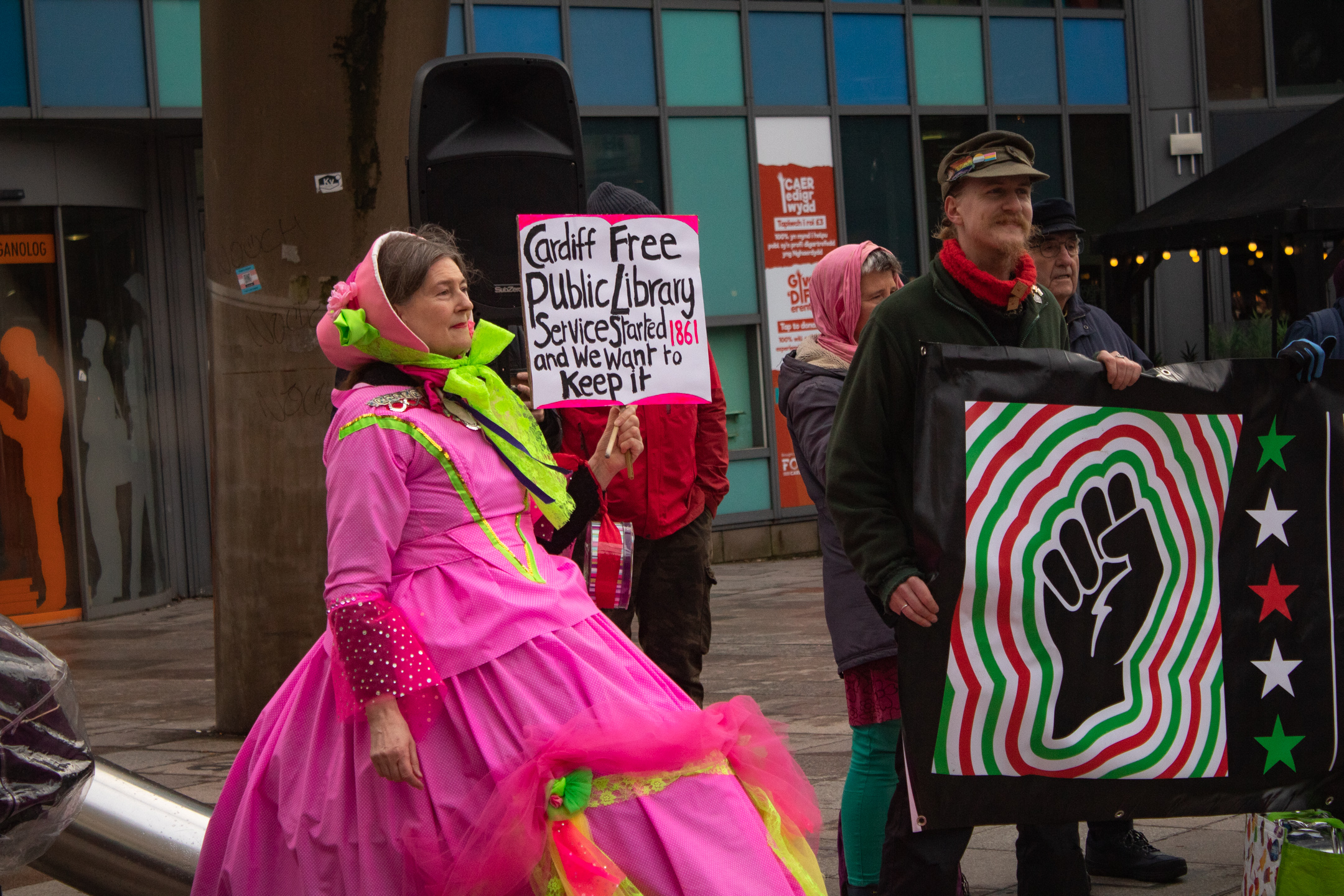
Do We Still Need Libraries? In Our Modern World, The Answer Is Yes
Council was recently forced to U-turn on plans to cut back the city’s library service. But the threat to these vital spaces continues. In the past decade, an estimated 1000 libraries have closed in the UK. A third in Wales have either been shut down or taken out of public control.
Here, Alice Shing, a campaigner who fought to save Roath Library in 2015 and stop the most recent cuts, writes about why these institutions are a vital part of our world today.
By Alice Shing. Cover image: A recent protest to stop library and culture cuts, led by Cardiff People’s Assembly. By Adwitiya Pal
Do we even need libraries anymore? With advances in technology, there is a noticeable push towards digitisation and online services, and to some, it may seem like a good time to roll back library services.
The answer is, of course we still need libraries. As existing users already know, they are not simply repositories for books, but have long since adapted to meet more modern requirements.
A 2019-2020 government survey found that besides borrowing books, and using printing and photocopying equipment, the third most cited reason for visiting a library, was to take a child to an event held there. Many mothers and parents of young children will not find this surprising, as libraries have become increasingly popular places for childcare activities.
They are accessible in a very practical sense; family-friendly spaces which can accommodate pushchairs, babies and toddlers; as well as having toilets, nappy-changing facilities, and something to entertain little ones with – at no cost.
Postnatal depression affects 10-15% of women within the first year of childbirth. Having somewhere regular to go, to meet other parents and toddlers, can make all the difference between feeling supported, or overwhelmed, and anxious at home.
Furthermore, from a developmental perspective, the early years sees a vital period of growth in children, as the architecture of the brain begins to be established. This is when foundational language and reading skills are introduced, as well as higher-functioning skills such as learning to focus, socialise, play and communicate with others.
However, the cost of transport, soft play, and other pre-school activities, can quickly become alarmingly expensive, particularly if looking after more than one child. When money is tight, being housebound with small children, alone, can put a huge strain on mental health as well as family relationships.
The harsh reality is that many women become financially vulnerable after starting a family. It may be due to lack of childcare support, wage differences, or cultural expectations but a lot of mothers end up going part time from work, or becoming full time (unpaid) carers when children are born. Eventually when mothers return to work, many face having to restart their careers again, earning a lower wage or perhaps in a different job. At the same time, most fathers continue in their careers relatively uninterrupted, which then compounds the wage gap between men and women. The result is, we end up with a society with inequality embedded within it, that reproduces itself in every generation.
Women make up half the population, and children make up all of our future, so If we want to see a fairer society, we must begin by protecting all services which help mitigate against inequality.
But it’s not just women and young children who benefit from libraries.
Since the Covid pandemic, mental health problems have been rising, and along with the cost of living crisis, many people are struggling. Those most affected are young people, people from the LGBTQ+ community, and people who are black or from minority ethnic groups.
Libraries are not a cure all of course – BUT, we can say without doubt, that libraries provide an incredible amount of value.
Primary schools combine outings to local libraries with road-safety lessons, teaching about community engagement, as well as supporting literacy. Children become more empathetic adults through reading stories. Research has shown that reading for a mere six minutes can reduce stress, and can also combat mental decline as well as Alzheimer’s from old age.
Visitors can learn how to crochet, and sometimes even how to handle a snake. Friends and Neighbours meetings allow people a chance to chat and get to know each other, which for some, might be their only chance of a conversation outside of their home.
Social isolation and loneliness is a major public health concern, as it can lead to poorer health outcomes, which subsequently puts pressure on health services. The Welsh Government recognises the importance of building strong communities, through inclusion of marginalised groups, strengthening community engagement and promoting the ability to make meaningful connections.
A library has no other agenda, than to do just that – by improving people’s education, quality of life, social connections and agency. We need to stop thinking of libraries as negotiable hostages in every round of cuts, but view them as our loyal allies particularly in times of struggle, helping to create and maintain a healthy society.
Equally we need to stop thinking of librarians as replaceable by machines. In the drive towards digitisation and online services, we must remember to be imaginative.
An article in Forbes mentions that the first ‘cars’ that were made, looked rather strange; an engine on wheels, pulling along a cart with passengers. This was mainly due to the designers focusing too much on the horse-and-cart model that had gone before it, instead of realising that by integrating the engine with the passenger box, something more comfortable, and truly innovative could be created.
Likewise, we should be thinking of ways to integrate technology and staff, rather than outright replace. Surely there are other models, other ways to innovate, that better suit users; ones which don’t result in redundancies that ultimately limit perceived gains, and curtail what libraries can potentially do for us, going into the future?
At the heart of a library, are the librarians, drawing together all the aforementioned elements into a holistic service that truly caters for all. Machines can monitor loans, but they tell nothing about how an exhausted mum found a reason to leave the house, how a child learned to clap joyously at songs and nursery rhymes, how a widower became less alone, or how someone borrowed a book that changed their life. Social connections do not come from data, and cannot be quantified by scanners. We need librarians because libraries are for human beings in the pursuit of human activities.
voice.wales is a vital alternative to the mainstream media. Whilst most publications want to keep the status quo intact, we work to challenge it. We survive with the help of our monthly subscribers and don’t have big-money corporate backers. If you can afford £3 a month or more, join us now to secure the future of alternative and radical media in Wales. Click here to join or go to https://www.patreon.com/voicewales
If you want to support us directly, please email [email protected]


This Isn’t Just A Cost Of Living Crisis – It’s A Social Emergency | Heledd Fychan